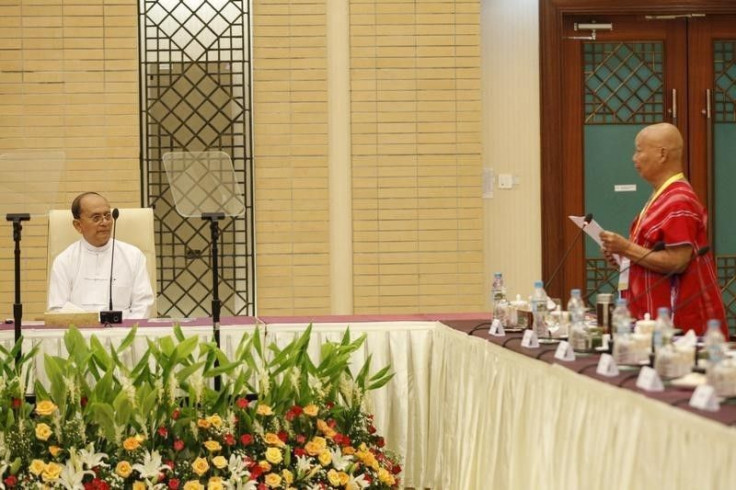Myanmar President Thein Sein Meets Armed Rebels For Peace Talks

NAYPYITAW (Reuters) - Myanmar President Thein Sein on Wednesday made his first public appearance since the start of a campaign for Nov. 8 general elections, meeting leaders of ethnic minority guerrilla groups for ceasefire talks in the capital Naypyitaw.
Clinching the deal with rebel groups would be a political win for Thein Sein, who made it his top priority, boosting the chances of his ruling Union Solidarity and Development Party in the first general elections since the end of military rule.
But a deal with all ethnic armies is unlikely, experts say, with some groups excluded from the talks, as fighting in the restive Kokang region along Myanmar's border with China has continued unabated since February.
Representatives of five main groups from about 16 participating in the talks met Thein Sein. The groups included the Karen National Union, the Kachin Independence Organization and the Karenni National Progressive Party.
"I'd like to stress the importance of peace in the transition to democracy," Thein Sein said at the opening of the talks. "Without peace, it is not possible. I hope today's summit will pave the way to signing the nationwide ceasefire agreement by the end of September."
The president is not running in elections, but the Myanmar constitution allows lawmakers, who select the president, to vote in a person from outside parliament, so giving Thein Sein a chance for reelection.
The draft of the agreement was hammered out during almost two years of grueling negotiations, but ethnic armed groups have refused to sign it, urging the government to amend the constitution and grant ethnic minorities more autonomy.
Tension between Myanmar's ethnic minorities and the majority Burmans, who dominate the government, has prompted many groups to take up arms and fight the military on the fringes of the country since independence in 1948.
Myanmar opposition leader Aung San Suu Kyi last week urged the rebels not to rush the deal, but work slowly on a pact to ensure lasting peace and stability. She said all groups should be included in the accord.
Suu Kyi's National League for Democracy is expected to win the election. Thein Sein's USDP won the last general poll held under military rule in 2010, widely condemned as rigged in its favor. The USDP is now likely to lose many seats.
In the first showdown of the election campaign, Suu Kyi will on Thursday meet voters in Kayah state, where powerful Minister of the President's Office Soe Thein, the architect of Thein Sein's economic reforms, is running for a seat in the election.
© Copyright IBTimes 2024. All rights reserved.





















